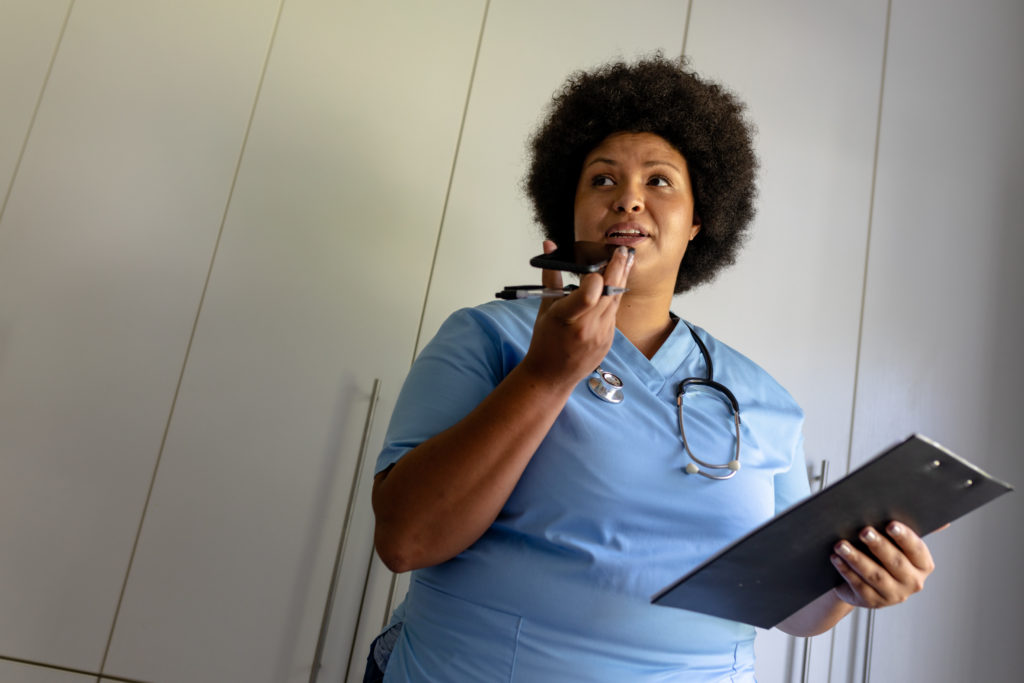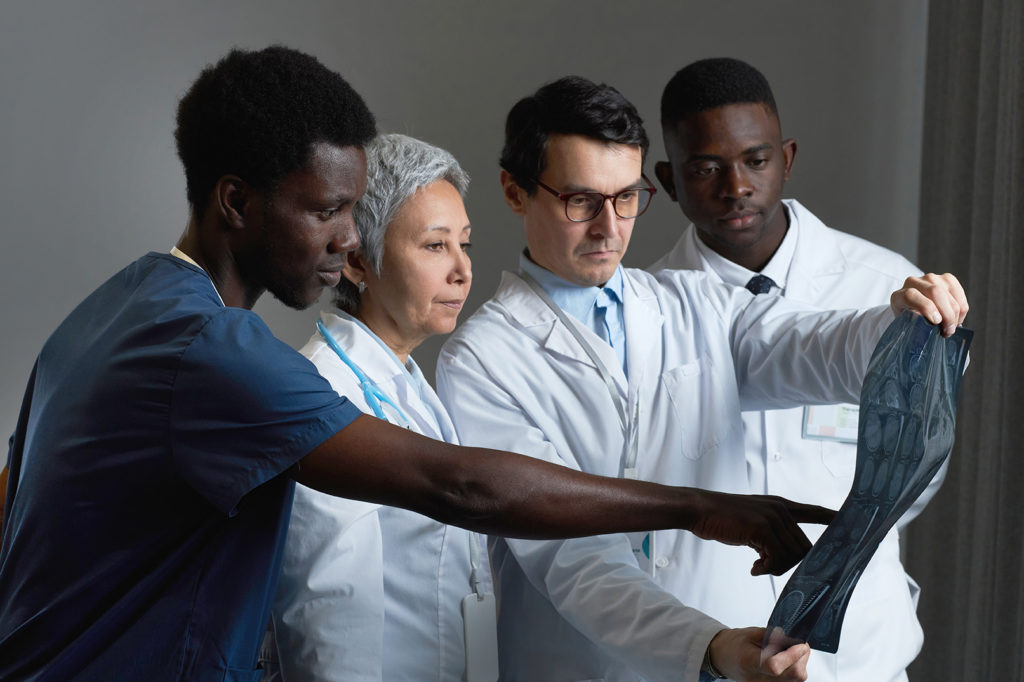According to the American Nurses Association, “A nurse practitioner (NP) is an advanced practice registered nurse (APRN) with advanced clinical training who provides direct patient care.” NPs work alongside physicians in both primary care and specialized areas in hospitals or in private practice. In some cases, NPs are able to practice independently. Learning how to become a nurse practitioner includes choosing the right educational path as well as earning the necessary licenses and certifications.
Education Pathway for Becoming a Nurse Practitioner
Becoming a nurse practitioner requires extensive education and training. So, what education is required for a nurse practitioner? All nurse practitioners must complete an undergraduate degree and a master’s degree or doctoral degree before they are eligible to practice.
Bachelor of Science in Nursing
The nurse practitioner education pathway most often includes completing a bachelor’s degree in nursing. Nursing bachelor’s degree programs give aspiring NPs the foundational knowledge they need to begin their nursing careers as well as hands-on experience in the form of clinical rotations.
Gaining Clinical Experience as a Registered Nurse (RN)
Upon completion of a nursing bachelor’s degree program, graduates are eligible to become registered nurses (RNs). Nurses are licensed through the states where they practice. In New York, RNs must apply for licensure through the New York State Education Department Office of the Professions.
Licensure requirements include:
- Good moral character
- Minimum of 18 years old
- Completion of a nursing education program accepted by NYSED
- Completion of New York State infection control coursework and child abuse reporting coursework
- Passing score on the National Council Licensure Examination for Registered Nurses (NCLEX-RN)
In New York, RN licenses must be renewed every three years and have associated continuing education requirements.
Graduate Degree Options: M.S. vs. DNP
Because they have more autonomy and responsibilities, nurse practitioners have education requirements beyond that of an RN. Although some NP programs do accept students who have not completed the RN licensure, nurse practitioner degree requirements to become a licensed NP in the state of New York include an RN license.
Those who complete undergraduate nursing programs are eligible to enroll in advanced programs to become nurse practitioners. Applicants must choose between a Master of Science in Nursing program or a Doctor of Nursing Practice (DNP).
Master of Science in Nursing
An Master of Science in Nursing meets the requirements to become a nurse practitioner in less time than a doctoral program. At Russell Sage College, for example, the nursing master’s program can be completed in just two and a half years and consists of 42 to 48 credits. Nursing master’s students can choose to specialize in the areas where they plan to practice, such as acute care or psychiatric mental health.
Doctor of Nursing Practice (DNP)
A DNP degree program covers similar material to an nursing master’s program, but with additional education in leadership and administration. In addition to coursework and clinical hours, DNP programs also typically require a capstone project that is based on their experience in nursing practice. At Sage, the DNP program can take two to five years, depending on whether the student is able to take full-time or part-time courses.
Specializations in Nurse Practitioner Programs
Nurse practitioners are licensed for specialized areas and must choose a specialization when they enter their graduate degree program.
Common NP Specializations
Nurse practitioners can choose to specialize in different areas. In New York, NP licenses are granted in the following specialties:
- Acute Care
- Adult Health
- College Health
- Community Health
- Family Health
- Gerontology
- Holistic Care
- Neonatology
- Obstetrics/Gynecology
- Oncology
- Pediatrics
- Palliative Care
- Perinatology
- Psychiatry
- School Health
- Women’s Health
Choosing the Right Specialty
Choosing the right specialty means choosing a population and type of care that will be the focus of your NP career. Not all nurse practitioner programs offer specializations in every area.
It is worth noting that choosing a specialty when completing an nursing master’s or DNP program does not mean choosing that specialty forever. Advanced training and certification are available beyond the initial graduate degree.

Clinical Training and Practical Experience
As with undergraduate nursing programs, hands-on clinical experience is critical to NP training programs. Even when NP courses are offered online, in-person clinical placements are a program requirement so that new nurse practitioners will get experience in their advanced roles.
Importance of Clinical Hours in Graduate Programs
NP programs include coursework in topics such as Nursing in Sociopolitical Environment, Research Methods, and Advanced Human Pathophysiology, and clinical hours are necessary for learning to apply these advanced concepts. Furthermore, national standards for NP licensure indicate that aspiring NPs must complete supervised direct patient care as part of their NP education program.
At Sage, clinical placements with nationally certified practitioners provide more in-depth clinical exposure to the advanced role of the nurse practitioner.

Preceptorships
Some or all of a nurse practitioner’s clinical hours may be completed as part of a preceptorship. A preceptorship is when a person studying to become an NP participates in clinical work under the direct supervision of a preceptor, who is an experienced nurse practitioner who mentors the studying nurse. NP programs may help students find local preceptors for their clinical training.
Certification and Licensing for Nurse Practitioners
Nurse practitioners must have both a state license to practice and board certification in their specialty in order to perform the nurse practitioner role.
Board Certification
Although board certification is not a requirement for licensure in New York, it is frequently a requirement for insurance purposes. The American Academy of Nurse Practitioners (AANP) identifies seven areas of practice focus:
- Adult-Gerontology Acute Care NP (AGACNP)
- Adult-Gerontology Primary Care NP (AGPCNP)
- Family NP (FNP)
- Neonatal NP (NNP)
- Pediatric NP (PNP)
- Psychiatric Mental Health NP (PMHNP)
- Women’s Health NP (WHNP)
Board certification involves completing a rigorous exam.
State Licensure
As with other nursing licenses, nurse practitioners are licensed in the states where they work. In New York, NP licenses are granted by the New York State Education Department Office of the Professions.
Licensure requires applicants:
- To be registered and licensed as an RN in New York
- To be of good moral character
- To meet education and experience requirements
- To apply for nurse practitioner certification with NYSED
Career Opportunities and Specializations for NPs
According to the Bureau of Labor Statistics (BLS), the demand for nurse practitioners is expected to grow by a whopping 40% between 2022 and 2032, which is much faster than the average for other professions. While nearly 90% of NPs are certified in Primary Care, the demand for NPs in specialized areas is also expected to increase, meaning there will be massive career opportunities for virtually every specialty in the coming years.
Career Settings for Nurse Practitioners
Nearly half 1 of all nurse practitioners work in physicians’ offices, while a quarter work in hospital settings. The remaining NPs work in outpatient care centers, the offices of other healthcare professionals, and in educational settings. NPs who choose to earn a doctorate may be well prepared to become nurse educators for the next generation of RNs or NPs at a collegiate level.
Specialization Opportunities
After initial board certification, NPs may also choose to go on and specialize further via Specialty Practice Groups,2 such as cardiology, oncology, or orthopedics. As of 2024, there are 27 specialty practice group offers through the AANP.
Learn More About the Russell Sage Nursing Program
Russell Sage offers both an nursing master’s degree and a DNP program for aspiring nurse practitioners. With flexible online courses, both programs are designed to work around the busy schedule of a working nurse. Graduates of Sage graduate nursing programs can go on to fulfilling careers as nurse practitioners with a degree of autonomy that is not possible as an RN. If you are ready to take the next step in your nursing career, speak with a Sage admissions counselor or apply today.

- https://www.bls.gov/ooh/healthcare/nurse-anesthetists-nurse-midwives-and-nurse-practitioners.htm#tab-3 ↩︎
- https://www.aanp.org/membership/aanp-communities ↩︎

